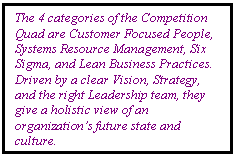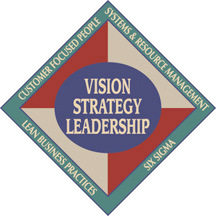Home
> About Us > News
and Articles >Company Certification
TCA's Lean Assessment and Certification Program
By Rick L. Smith
This article is not for the faint Lean zealots at heart. Nor is it for the random Kaizen facilitators. It is not for the CI team members who religiously organize the “improvement of the month club” either. This article is for those who dare open their doors to scrutiny and open their minds to change.
Most companies want to know they’re improving. They evaluate performance and feel good when they see consistent increases in productivity. They may also do some benchmarking. But few really want to know how they measure up to the competition, can truly confirm they are on track for becoming a World Class company…and have the certification to prove it.
Through the 25 years of TCA’s involvement with hundreds of Lean implementations, we realize our clients need to know what World Class looks like, how they compare and what it will take to get there. All embrace the “continuous improvement” theory because we never reach perfection; but some take a couple steps forward, a step back, another step back, and then start all over again—and still call it continuous improvement. When clients understand a World Class/Lean organization, they can wrap their arms around the actions needed to get there.
TCA’s Lean Assessment and Certification Program makes this happen.
 
Using TCA's Competition Quad, we audit all facets of an organization and compare day-to-day activities to a “World Class” Enterprise. We start with an analysis of Vision, Strategy, and Leadership. For example, their Vision may be documented and communicated; however, we may reveal a gap between their Vision and customer values or find that employee involvement isn’t considered in developing them. Strategic priorities may not be aligned, or leaders may not be fully behind the implementation plan.
Evaluating Each Quadrant
The first quadrant we assess is Customer Focused People (CFP), including these criteria:
• Value Stream Organization
• Level of decision making and problem solving
• Approach to supervision and management
• Customer focus at every level
• Support for the improvement process
• Enfranchisement
• Leadership skills
• Team approach
The audit determines whether employees understand the processes all around them—not just their own daily routines. Do they know their internal customers and the relationship to their work? Are they clear on their role and how important it is to their upstream and downstream processes and team members? Employees of World Class companies know who their internal and external customers are. This understanding and knowledge build teams who provide solutions not just hired hands.
The second quadrant, Systems & Resource Management, evaluates the company’s ability to predict and perform to plan. Our assessment looks for indicators that show how accurate the forecasting model is:
• Is the planning function responding to the forecast and customer demand?
• What is the capacity available-to-promise?
• What is the on-time delivery performance?
• What is the total and incremental cost?
• Is the MRP or ERP system functioning in a Lean environment--planning vs.
execution and pull systems for signaling produciton, parts replenishment, etc?
The third quadrant involves Six Sigma and quality performance metrics:
• Does the cost of quality and defects continually decrease?
• Are customer ratings excellent?
• Are audit routines consistent with those of recognized registrars?
• Is the quality program focused on prevention rather than detection?
• Does the process allow employees to learn from mistakes and identify steps to prevent recurrence?
The fourth quadrant, Lean Business Practices, evaluates and measures how well Lean tools are applied to affect the bottom line:
• Waste elimination
• On-time performance
• Quality
• Customer satisfaction
• CI culture
Most important is the ability to measure success in driving desired behaviors. Everyone must understand the metrics well enough to apply them as they improve. And these measures must be simple and easy to maintain.
The Results—Certified
A Lean Assessment and Certification program doesn’t just focus on delivery times, throughput, quality, and customer satisfaction. It drives deep into the company’s foundation examining the distance to World Class/Lean and defining ways to stay ahead of the competition.
Our assessment reveals the gaps and missing ingredients to achieving World Class/Lean status. This is the moment when the light becomes bright and a new vision is born. Clarity brings understanding, understanding builds education, and education drives behaviors. This becomes more than a goal; it’s a purpose—and not just for the management team, executive team, or the steering team. The process must be embedded in the hearts of everyone in the organization.
Many companies use this assessment to certify themselves as a truly World Class/Lean organization—compared and ranked with others in their industry.
This guarantees to customers that the organization provides services and products with the least waste and in the most cost-effective way available. Certification assures customers and suppliers of willingness to partner with them in creating a much stronger value stream, focused on higher satisfaction.
*****************
Still not convinced? Go back to paragraph 1. Or call TCA to find out more about how Lean Assessment and Certification can help your company.
Contact Us for a Free Assessment!
|



